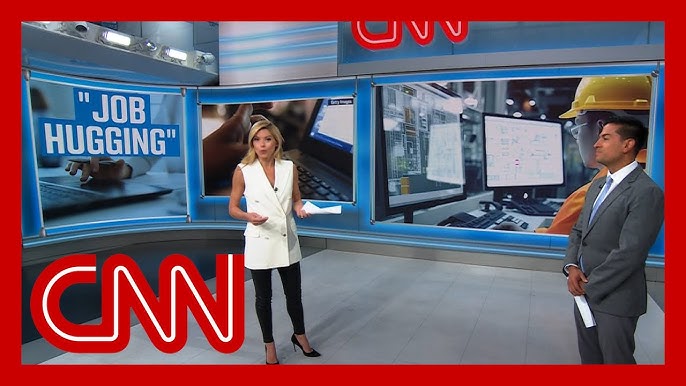
A new trend emerges in the economy. What is ‘job hugging?’
CNN
264,538 views • 5 months ago
Video Summary
The Great Resignation appears to be over, replaced by a new trend called "job hugging." This phenomenon describes workers holding onto their current positions out of fear of job loss and uncertainty about their ability to secure new employment. Data indicates a significant drop in the job-to-job change rate since its post-COVID peak, with even pay increases for those who do switch jobs now lagging behind pre-COVID levels.
This shift is particularly noticeable in white-collar professions, such as finance, tech, and business services, where employees are paid monthly. The underlying cause, according to economists, is a decline in consumer confidence regarding future employment. A University of Michigan survey reveals that 60% of consumers now expect unemployment to rise, the highest rate since the Great Recession, further contributing to this job-holding behavior.
Additionally, a hiring freeze observed in various sectors, as reported by Bank of America, likely stems from concerns over trade policy volatility and tariff uncertainty. This combination of factors is leading workers to prioritize job security over the pursuit of new opportunities, signaling a significant change in the labor market landscape.
Short Highlights
- The Great Resignation is over, with workers now "job hugging" by holding onto their current jobs.
- Job-to-job change rates have significantly decreased since their post-COVID peak.
- Pay increases for job switchers have fallen to 7%, below pre-COVID levels of 10%.
- Consumer confidence in finding new jobs is at a low, with 60% expecting unemployment to rise, the highest since the Great Recession.
- Hiring freezes in white-collar sectors like finance and tech are linked to trade policy uncertainty.
Key Details
The End of the Great Resignation and the Rise of "Job Hugging" [00:00]
- The trend of workers frequently changing jobs, known as the Great Resignation, has ended.
- A new phenomenon called "job hugging" is emerging, where employees are holding onto their current jobs.
- This behavior is driven by increased worry about losing their jobs and a decreased confidence in their ability to find new employment.
This section introduces the concept of "job hugging" as a successor to the Great Resignation, highlighting a shift in worker sentiment towards job security.
"Say goodbye to the Great Resignation. There's new data showing that more workers are staying, is staying put in their current jobs making way for a new trend?"
Declining Job Hopping and Pay Increases [00:37]
- The job-to-job change rate has significantly decreased since its peak in 2022.
- During the Great Resignation, workers felt confident in securing better jobs with higher paychecks.
- The average pay increase for job switchers has fallen to just 7%, which is below the pre-COVID average of 10%.
This part of the transcript details the statistical evidence for the decline in job hopping and the diminished financial incentives for changing jobs.
"But look at this. It's come down to just 7% now below the pre-COVID."
"Job Hugging" in White-Collar Sectors [01:38]
- "Job hugging" is most evident in jobs where employees are paid monthly.
- This trend is prevalent in white-collar professions, including finance, tech, and business and professional services.
- Examples of affected roles include managers, lawyers, and accountants.
This section specifies the types of jobs and industries where the trend of holding onto jobs is most pronounced.
Economic Factors Driving "Job Hugging" [01:58]
- Economists attribute this trend to a loss of confidence in the ability to secure better employment.
- A University of Michigan survey shows that 60% of consumers anticipate unemployment to increase over the next year.
- This is the highest level of concern about rising unemployment since the Great Recession.
Here, the focus shifts to the economic indicators and consumer sentiment that explain the underlying reasons for the current labor market behavior.
"So why is this happening again? Economists say this reflects a loss of confidence in the ability to get a better job."
Hiring Freezes and Trade Policy Uncertainty [02:30]
- Bank of America reports a hiring freeze in several sectors.
- This freeze is likely a response to concerns about tariff uncertainty and volatility surrounding trade policy.
This final section highlights an additional contributing factor to the stagnant job market: a reluctance from employers to hire due to broader economic and policy uncertainties.
Other People Also See



